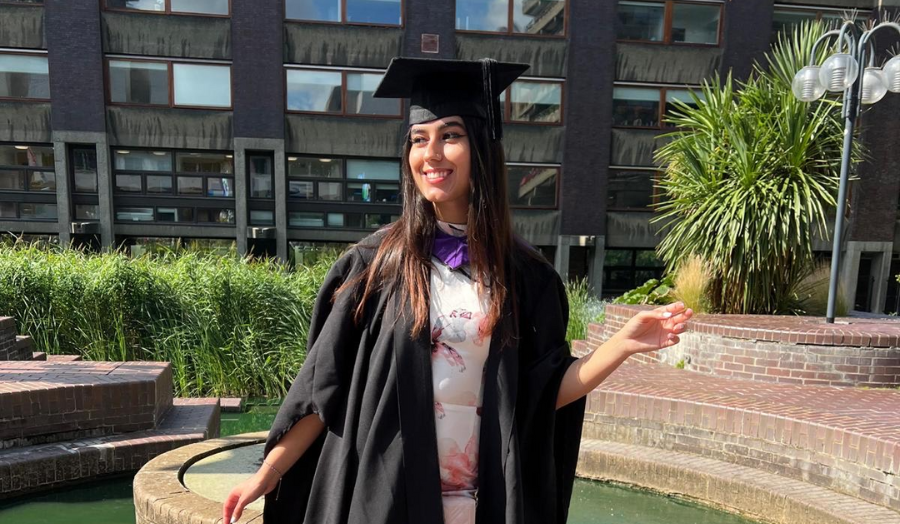Forensic Science BSc graduate Joanne Baleira is about to start a dream job as a DNA Analyst at world leading lab Eurofins. She reflects on her experience as a student at London Met, where she was elected student representative by her peers on her course for 3 years in a row, and shares some advice for new students.
Tell us a little bit about yourself…
My name is Joanne, I am Portuguese and was born in London, where I was raised in South West. My parents were both born in Portugal but moved to the UK when they were in their early 20s to find better opportunities and start a family, where they eventually had myself and my younger brother. Growing up in a Portuguese household, I learned some life skills at a young age and developed a determination to do my best at everything I do. My plan was always to attend University, but never did I think I would end up taking the routes that I did.
What brought you to London Met?
I joined London Met through Clearing, originally studying Health and Social Care. However, I decided that I did not want to pursue this course and stumbled across the Forensic Science BSc on the London Met student zone. After analysing the course details, I fell in love with the idea of becoming a Forensic Scientist and submitted my application immediately. I can honestly say that this was the best decision that I made. I should probably mention the SuperLab I got to work in! It is a massive lab which helped me develop GLP (Good Laboratory Practice) and gained an insight on what it is like working in a laboratory environment.
What did studying at London Met mean to you?
Attending University was always part of my plan, but as a young person still discovering new experiences, I was never set on a course. Being a student at London Met steered me towards Forensic Science and I never looked back. Studying Forensic Science opened a door to a whole new world in terms of knowledge, opportunities and skills. I quickly realised that I enjoyed working in the SuperLab and when it came to deciding on a dissertation topic, of course I had to choose a lab-based report! Career wise, I see myself working in a lab, so I am very grateful that London Met has allowed me to develop transferable skills.
Tell us about your new role
I am very excited to share that I am starting the role of a DNA Analyst at Eurofins! Some of my favourite modules were criminalistics and inferences of biological remains, which focused mainly around the forensic aspect of my course. Although DNA is generally covered in most modules, inferences of biological remains provided in depth knowledge on areas, such as STRs (short tandem repeats) and the techniques used as well as why it is used in a forensic context, which is vital knowledge for my position as a DNA Analyst.
What is your biggest passion in life and where did that passion come from?
I have always been very close with my family, especially with my parents. When I realised the sacrifices they made by coming to the UK for a future, not only for themselves, but for myself and my brother, it sparked a drive for their decision to not be in vain. University requires a lot of time management and there were days where I struggled to find the time for everything. When my family saw how stressed I was feeling, they would always go the extra mile to encourage me and reassure that I was doing great and no matter what happened, they would always be proud of me. It is in moments like these that I tend to finally snap out of the negative mindset and show that their support motivates me.
What’s the proudest moment for your time at London Met?
When I got 95 in my bioanalytical problem-solving exercise. I struggle with maths and numbers so being able to understand what I was doing and answer the questions made me feel really proud.
What are your career ambitions?
I enjoy working in a laboratory and as I have laboratory experience, I am confident with my start as a DNA Analyst. However, I am open to expand my forensic expertise and would like to gain as much experience as I can in different departments. Ultimately, my goal is to work as a Forensic Scientist on crime scenes, collecting and packaging evidence and photographing crime scenes.
Do you have a message for the teaching staff on your course?
First of all, a massive thank you to Masuma Ahmed-Ali; if you look up in the dictionary ‘tough love’ you will see Masuma’s name right next to it! She drilled the words ‘contemporaneous notes’ into my head and taught me the values of working in a forensic environment. I would also like to mention Dr Bhaven Patel as if it was not for him helping me study and replying to my emails at 10pm, I would not have gotten a 95 in that bioanalytical problem-solving test. Not only did I form good bonds with most lecturers, who became trustworthy mentors to me, but I found the best group of friends that helped me every step of the way.
Any top tips for anyone thinking about studying a forensic science course here?
Be prepared to soak in a lot of scientific material and do not be afraid to ask for help, you will receive it every time. As long as you have confidence in yourself and manage your time efficiently, you got this!

